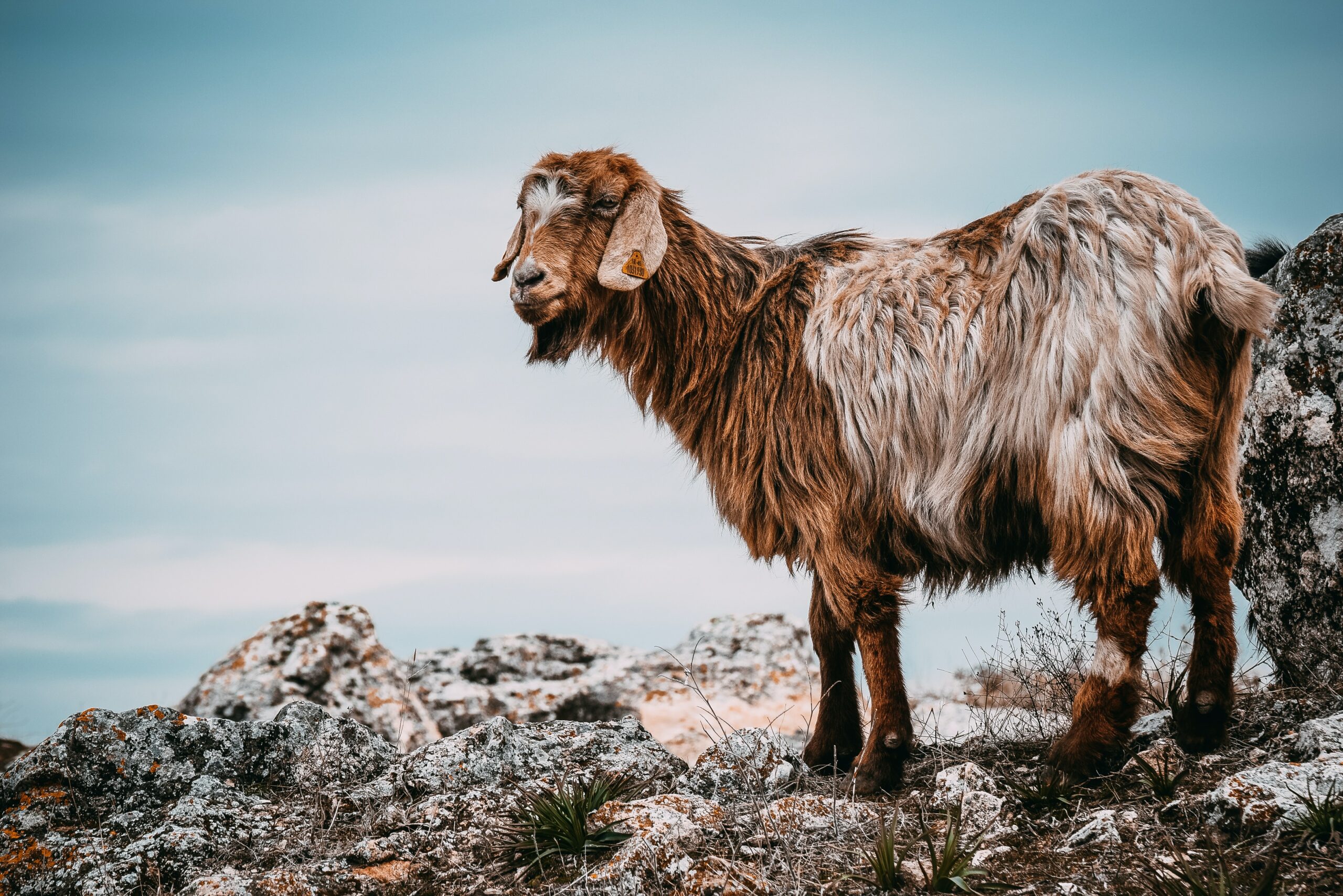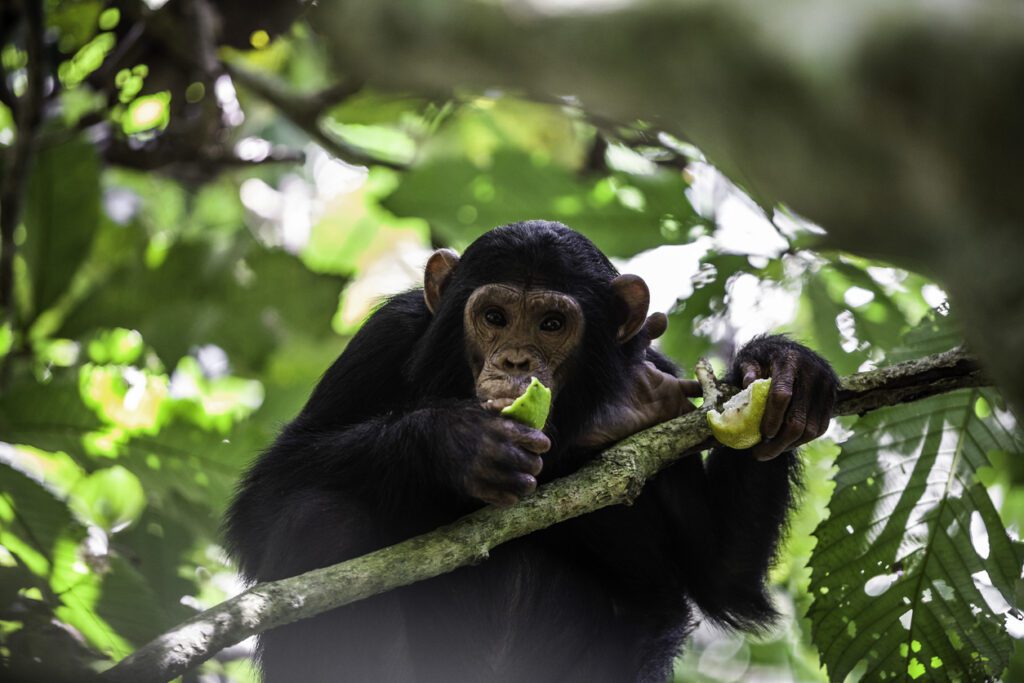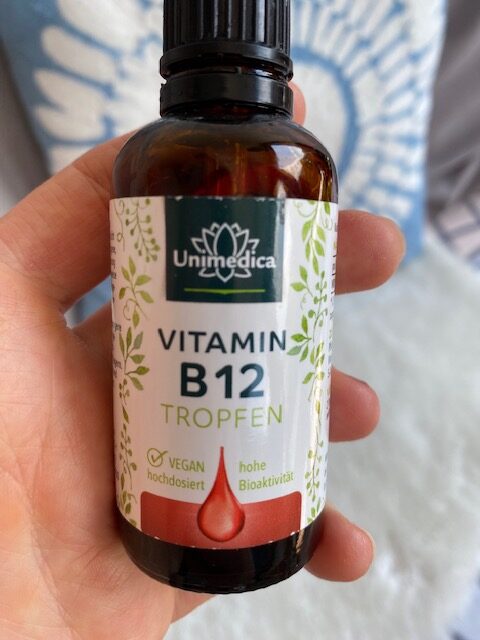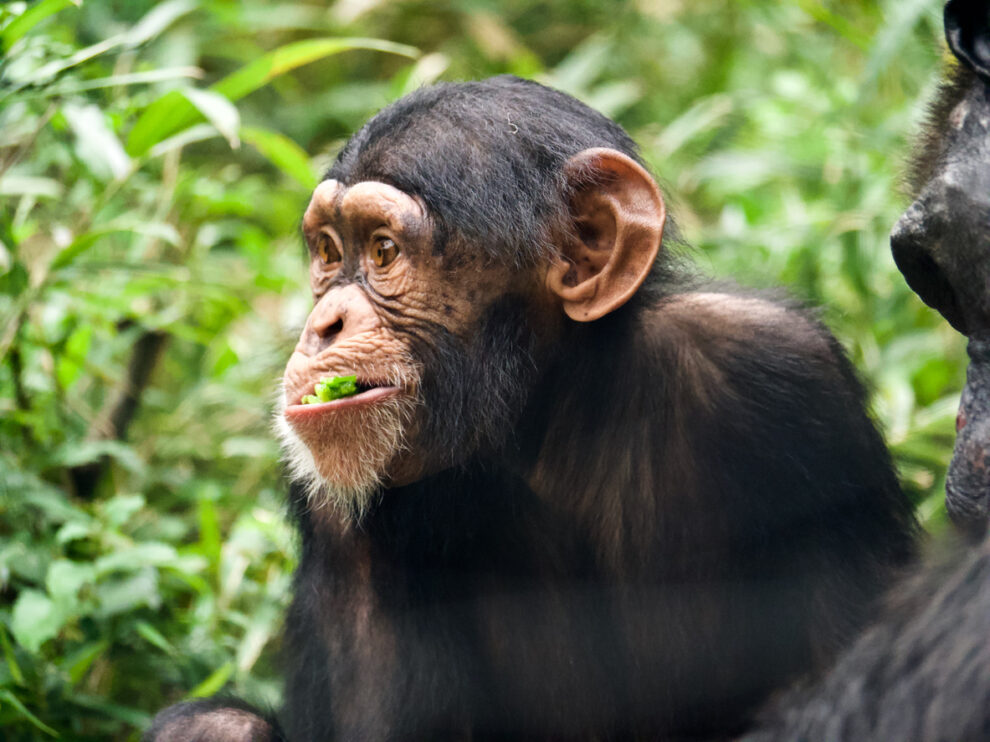Herbivorous animals cannot rely on B12 intake from foods. Thus they have different ways to get enough of the essential vitamin internally. Ruminant herbivores (like goats, cows, and horses) get vitamin B12 from their specialized microbiome. Non-ruminant herbivores (herbivorous rodents like mice and guinea pigs) eat B12-containing excrements.
And what about highly frugivorous apes, and humans? Can we get enough B12 from our microbiome, or do we obligatorily need animal-based foods for B12?
B12 production in apes and herbivores
A healthy microbiome produces vitamin B12 in both, frugivores (including humans) and herbivores when cobalt is available from the diet. So what we need is the right bacteria and cobalt:
Cobalt: the mineral needed for B12
Cobalt is an essential mineral found in plant foods, especially greens and nuts. Herbivores eat greens, and frugivores eat nuts and greens, too. The intestinal bacteria need cobalt from food to synthesize B12. In a sense, b12 deficiency is a cobalt-deficiency.
Cobalt is the core part of the complex molecule (blue dot in the image). The name cobalamine (another name for vitamin B12) already tells us how vital the mineral is, as the molecule is named after it: cobalamine stands for an organically bound cobalt with amine -groups (red dots).
The cobalt ion is essential for the molecular structure of B12 and, thus, the biological activity as a vitamin: methylation of DNA (gene expression), and as a cofactor for enzymes being the most prominent functions.
Cobalamin exists as three naturally occurring compounds (methylcobalamin, adenosylcobalamin, hydroxycobalamin) and one synthetic form (cyanocobalamin), which is widely used in supplements, as it is inexpensive (but not the most recommendable, see below).

Bacteria: B12 is produced by the microbiome of herbivores and frugivores
Animal cells themselves cannot produce B12, but our mutualistic bacteria do! The gut microbiome is a diverse ecosystem of bacteria residing in the intestines and has been found to possess the ability to produce vitamin B12. Think about it like this: the bacterial genomes are basically an extension of our own genome. Bacteria take over specialized biochemical functions that our own cells lack the ability to do – it basically is the outsourcing of costly biochemical reactions. On the other hand, the animal host, offers the microorganism a habitat and food.
Ruminant animals like cows and sheep have a complex digestive system to digest greens and specialized intestinal bacteria types, like Prevotella and Succinivibrionaceae, that produce B12. Those herbivorous animals are held as “livestock” and produce the typical animal-based, B12-containing foods that we know.

Other types of plant-based mammalian species, like frugivores (humans and other apes), also do possess a B12-producing microbiome. In humans, biologically active vitamin B12 is produced by Pseudomonas and Klebsiella sp. However, there might be a problem that prevents us from getting enough B12 from the microbiome alone (read more here).

This type of host-bacterial symbiosis is found in countless interactions in nature. But back to our intestinal symbiotic microorganisms. A recent study found that “human gut microbial communities produce B12 and sustain growth and metabolic activity… gut communities did not rely on exogenous B12.” (Kundra et al., 2022).
That the intestinal microbiome produces B12 is nothing new. However, there are still doubts that in humans, this suffices to get enough B12 – or get B12 at all. The question is addressed in our in-depth article, but basically, our gut health and microbiome are comprised due to suboptimal habitat and environmental health… but, in optimal, natural conditions, seem very much able to provide us with B12 internally.
The sheer presence of B12-producing bacteria in apes is a good indication that they (we) potentially can get B12 from our gut. However, under suboptimal conditions, the delicate intestinal health can be compromised.
Where there is smoke, there is fire.
Apes get B12 from insects – and poo…
How do apes get vitamin B12 in nature?
In the wild, apes eat B12-rich insects (approximately 0.1-1 % of their diet) and other animal foods, and they also might get the vitamin from their healthy (!) microbiome, as they live in their natural habitat. After all, apes (including humans) do host bacterial strains that produce the compound – for a reason!
Further, not all apes might eat insects for nutrition: mountain gorilla populations seem not to eat insects intentionally but rather ingest them with fruits coincidentally. It is a topic of debate whether or not they nutritionally need insects (see here and here), and – like humans – it seems that gorillas do not identify insects as food sources if they have not socially learned it. And while humans are not exactly built like gorillas, it still is worth mentioning the possibility of a primate not needing insects as a vitamin B12 source!
In captivity, apes – like orangutans and chimpanzees – are sometimes coprophagic, meaning they eat their B12-containing excrements (a very rare behavior in the wild). A possible explanation is that their B12 supply from food is less abundant, and their microbiome might be less healthy, within this setting compared to the wild.
Thus, apes eating their own poop in the zoo is actually an alarming situation in terms of diet.

While apes enjoy foraging insects, humans do not feel instinctually appealed to eating insects. But, would we – in nature – also eat B12-rich insects, like our closest relatives? Or maybe, in the wild, we would eat insects that are hidden in (and on) fruits, like in the case of gorillas? But then, we are so picky with insects and do not eat fruits if we detect insects in them… and even worse, our own feces?!
“Human faeces contain appreciable quantities of vitamin B12 or vitamin B12-like material presumably produced by bacteria in the colon, but this is unavailable to the non-coprophagic (non-faeces-eating) individual.”
Albert et al., 1980
So what is going on with our b12 source in nature??? Humans would not really want to eat poop or insects, or raw meat. Nor do we get B12 from our microbiome… or do we? We can conclude that frugivores – like herbivores – have bacteria that are able to produce and eventually provide B12, but seem not to rely on this source entirely.
Update on bananas:
Bananas as a vitamin B12 source?
Lately, it is being mentioned as a plant-based source of vitamin B12 – which is very surprising, given that B12 is found in animal-based foods and is produced by microorganisms! Do bananas really contain vitamin B12? Recent studies describe banana pulp and peel as a source of vitamin B12. See here, here, and here. A vitamin B12-containing fruit is something that would contribute to a shift in dogma concerning B12 and plant-based nutrition. I can’t fully grasp the idea of a B12-containing fruit yet – it’s too good to be true! Read more about bananas.
Traditionally, bananas were used to combat anemia, which could be due to two key nutrients for blood building: iron and vitamin B12. The iron content is sometimes described as low and sometimes as high. Such contradicting information is not surprising considering the differences in the quality of the fruits. I assume that the vitamin B12 content of bananas is variable, too, and I would not consider them a reliable source, especially if you cannot get high-quality produce. Further, there is a lack of information on the type of B12 found in bananas, whether it’s a bioactive form of cobalamin or pseudocobalamin.
This topic is highly relevant for plant-based diets, and more research on whether bananas can be a B12 source for humans would further aid in understanding the human diet and the role of tropical fruits in it!
B12 in bananas also would be a possible factor in increased coprophagy and B12 deficiency in primates in zoos: newer unnatural feeding ideas and nutritional guidelines advise cutting out sweet fruits, including bananas. I know its not only extremely irrational to deprive animals of their natural foods – it’s also sad and cruel! Read more here.
If you adopt a plant-based diet, it is highly recommended to get your b12 levels checked frequently and/or to take a supplement:
Supplement B12 on a plant-based diet
What does the above all mean for vitamin B12 supplementation? We do have B12-producing bacteria in our microbiome, on which we cannot rely entirely in most cases. And, the closer we stick to nature, prevent our microbiome from being damaged by antimicrobial agents, and stick to our species-specific diet, a tropical frugivorous diet, the less likely we need to supplement B12.
For now, this means most of us need a supplement on a plant-based diet.
Can you benefit from supplementing vitamin B12? My educated guess is, that you benefit if
- your microbiome is unbalanced and pre-damaged
- you had antibiotics in your lifetime
- you are exposed to chemical pollution (agriculture or urban life)
- If your foods do not contain enough cobalt
What type of supplement
The quality of vitamin B12 supplements matters: generally, methylcobalamin is being favored over the commercially most easily available cyanocobalamin: methylcobalamin is the natural and active form found in foods (read more here on different types of B12). It also has been shown to have more positive outcomes for the microbiome (Xu et al.; 2018).

References
- Niklewicz, A. et al. (2022) ‘The importance of vitamin B12 for individuals choosing plant-based diets’, European Journal of Nutrition, 62(3), pp. 1551–1559. doi:10.1007/s00394-022-03025-4.
- Vitamin B12 in Plant Foods (no date) VeganHealth.org. Available at: https://veganhealth.org/vitamin-b12/vitamin-b12-plant-foods/ (Accessed: 28 May 2023).
- Franco-Lopez, J. et al. (2020) ‘Correlations between the composition of the bovine microbiota and vitamin B12 abundance’, mSystems, 5(2). doi:10.1128/msystems.00107-20.
- Albert, M.J., Mathan, V.I. and Baker, S.J. (1980a) ‘Vitamin B12 synthesis by human small intestinal bacteria’, Nature, 283(5749), pp. 781–782. doi:10.1038/283781a0.
- Kundra, P. et al. (2022) ‘Healthy adult gut microbiota sustains its own vitamin B12 requirement in an in vitro batch fermentation model’, Frontiers in Nutrition, 9. doi:10.3389/fnut.2022.1070155.
- Intestinal bacteria as a vitamin B12 source (no date) VeganHealth.org. Available at: https://veganhealth.org/vitamin-b12/intestinal-bacteria-as-b12-source/ (Accessed: April 5, 2023).
- Hamad, I. et al. (2014) ‘Detection of termites and other insects consumed by African great apes using molecular fecal analysis’, Scientific Reports, 4(1). doi:10.1038/srep04478.
- Watts, D.P. (1989) ‘Ant eating behavior of mountain gorillas’, Primates, 30(1), pp. 121–125. doi:10.1007/bf02381219.
- Hills, R. et al. (2019) Gut microbiome: Profound implications for diet and disease. Nutrients, 11(7), p. 1613. doi:10.3390/nu11071613.
- A. Gomez et al., Plasticity in the human gut microbiome defies evolutionary constraints. mSphere. 4 (2019), doi:10.1128/msphere.00271-19.
- A. K. Sharma et al., Traditional human populations and nonhuman primates show parallel gut microbiome adaptations to analogous ecological conditions. mSystems. 5 (2020), doi:10.1128/msystems.00815-20.
- Zimmermann, J. (2022a) Formen von Cobalamin (vitamin B12) IM überblick: Kanyo®, Vital und Gesund. Available at: https://www.vital-und-gesund.de/b12/cobalamin/ (Accessed: 28 May 2023).
- Amini Khoozani A, Birch J, Bekhit AEA. Production, application and health effects of banana pulp and peel flour in the food industry. J Food Sci Technol. 2019 Feb;56(2):548-559. doi: 10.1007/s13197-018-03562-z. Epub 2019 Feb 8. PMID: 30906012; PMCID: PMC6400781.
- Isnaeni, I., Zufara, B.S. and Lewa, I.W. (2020) ‘Alternative optical methods for qualitative detection of vitamin B6 and B12 of Banana’, Jurnal Teknologi dan Industri Pangan, 31(2), pp. 147–154. doi:10.6066/jtip.2020.31.2.147.
- Grossman A. Nutrient Acquisition: The Generation of Bioactive Vitamin B12 by Microalgae. Curr Biol. 2016 Apr 25;26(8):R319-21. doi: 10.1016/j.cub.2016.02.047. PMID: 27115686.
- Oyeyinka, B.O.; Afolayan, A.J. Suitability of Banana and Plantain Fruits in Modulating Neurodegenerative Diseases: Implicating the In Vitro and In Vivo Evidence from Neuroactive Narratives of Constituent Biomolecules. Foods 2022, 11, 2263. https://doi.org/10.3390/foods11152263
- Xu, Y. et al. (2018a) ‘Cobalamin (vitamin B12) induced a shift in microbial composition and metabolic activity in an in vitro colon simulation’, Frontiers in Microbiology, 9. doi:10.3389/fmicb.2018.02780.


Add Comment